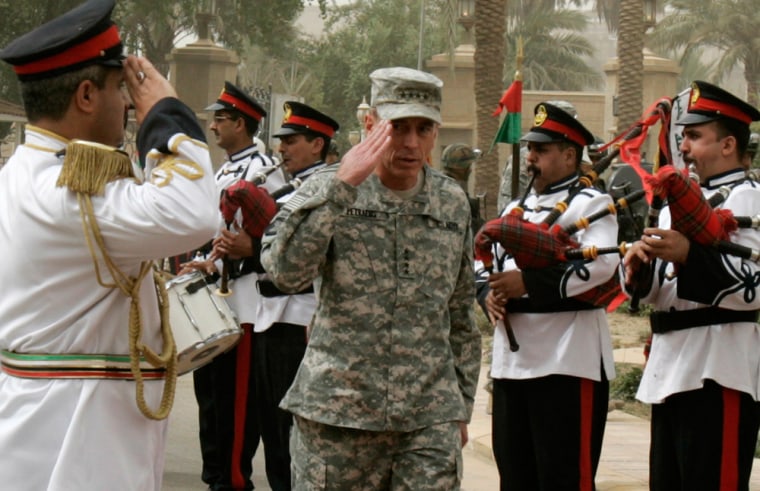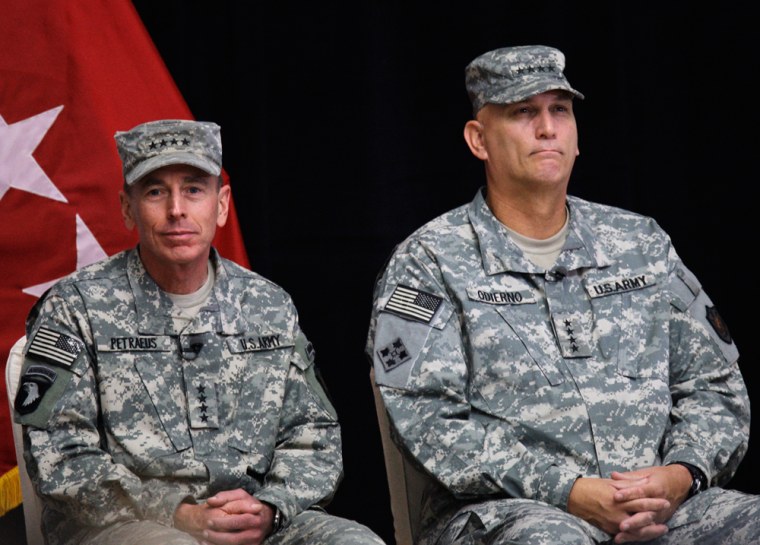General Ray Odierno, who took command of U.S.-led forces in Iraq on Tuesday, warned that recent gains in the country were reversible despite dramatic security improvements under his predecessor Gen. David Petraeus.
Petraeus' strategy for countering the Iraq insurgency is credited by many with rescuing the country from all-out civil war. Odierno faces the challenge of ensuring those security gains do not unravel at a time when American troop levels are being reduced.
The two generals had formed an "incredible team" during the deployment of 30,000 extra U.S. troops to Iraq last year, U.S. Defense Secretary Robert Gates said at a handover ceremony at a cavernous rotunda of a former Saddam Hussein palace outside Baghdad. The towering, shaven-headed Odierno served as the number two U.S. commander in Iraq for 15 months until February.
"He (Odierno) knows that we are at a pivotal moment — where progress remains fragile and caution should be the order of the day," Gates said.
Odierno reinforced that message, saying that while Iraq was a different country from two years ago — when it was on the brink of civil war — improvements in security were reversible.
The Pentagon will pull 8,000 troops out of Iraq by February, leaving 138,000 soldiers deployed there. All five extra combat brigades sent to Iraq last year completed their withdrawal in July and have not been replaced.
Despite the drop in overall violence in Iraq to four-year lows, the Bush administration has taken a cautious approach to troop cuts and any decision on a major withdrawal will be left to the next U.S. president, who takes office in January.
The Iraqi government wants U.S. troops to withdraw by the end of 2011 under a security deal being negotiated with Washington.
Asked if he thought Iraqi forces would be ready to handle security by then, Odierno told reporters: "We'll see what the agreement says but ... 2011 is the date we're looking towards. I think it has to do with the capacity we're able to build ... I'm cautious in making any judgments at this time."
Odierno added that a key challenge was making sure militant groups could not bounce back.
A female suicide bomber killed 22 people at a dinner celebration for police in Diyala province on Monday, hours after two car bombs killed 12 people in the capital Baghdad.
'Fearsome beating'
Odierno and Petraeus came together last year to implement a new counter-insurgency strategy that helped drive violence down, allowing Iraq to begin seeking foreign investment to rebuild after decades of war and U.N. sanctions.
"Slowly, but inexorably, the tide began to turn. Our enemies took a fearsome beating they will not soon forget," said Gates.
Odierno will face other challenges.
Iraq's Shiite-led government will soon take control of Sunni Arab tribal units that joined forces with the U.S. military to fight al-Qaida. Some analysts fear the tribal units, which include many former Sunni Arab insurgents, could turn their guns on the government if their demands are not met.
Odierno also stressed the importance of Iraq holding provincial elections, which U.S. officials hope will cement national reconciliation by giving groups that boycotted the last local polls in 2005 a voice in regional affairs.
The elections were to have been held next month, but have been delayed by bickering between Kurds and Arabs in parliament over an electoral law.
Gates lauded Petraeus in his speech at the ceremony.
"You ... dealt the enemies of the United States and Iraq a tremendous, if not mortal, blow. History will regard you as one of our nation's great battle captains," Gates said.
From October, Petraeus will head the U.S. Central Command, the headquarters overseeing operations in the Middle East and beyond, including the war in Afghanistan.

Petraeus said the insurgents and militia extremists who have created such chaos in Iraq over the past five years are now weakened but not yet fully defeated. He noted that before he took the assignment in February 2007 he had described the situation as "hard but not hopeless."
He thanked his troops for having "turned 'hard but not hopeless' into still hard but hopeful."
Officials and analysts say other factors also played a big role in reducing violence in Iraq, including a decision by former Sunni Arab insurgents to turn against al-Qaida and a ceasefire imposed by Shiite cleric Moqtada al-Sadr on his Mahdi militia.
Gates recalled the perils faced by Petraeus in February 2007.
"Darkness had descended on this land," Gates said. "Merchants of chaos were gaining strength. Death was commonplace," and people around the world were wondering whether any Iraq strategy would work.
'13 feet of general'
Injecting a bit of humor, Gates made note of what he called "one other historical achievement" for the new command team of Odierno and Lt. Gen. Lloyd Austin, who replaced Odierno in February as the No. 2 commander and will remain until next spring.
"Between Gen. Odierno and Lt. Gen. Austin we just might have the tallest command in American military history — about 13 feet of general by my estimate," Gates said. Each of the generals is nearly 6 feet 6 inches tall.
